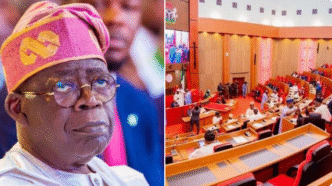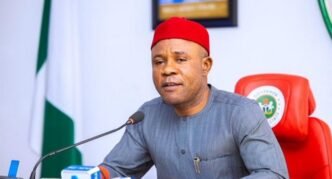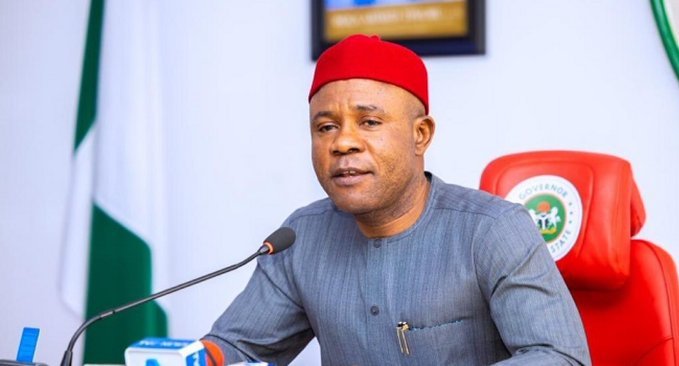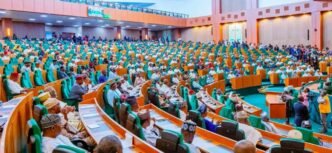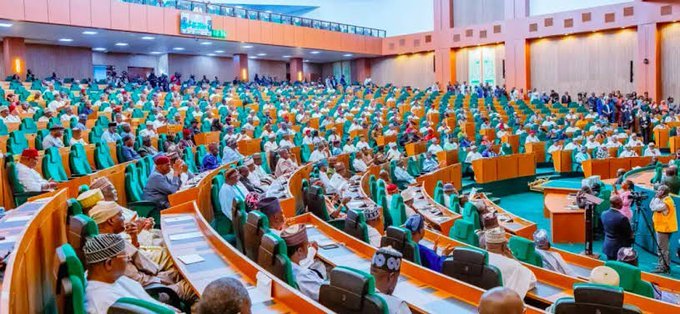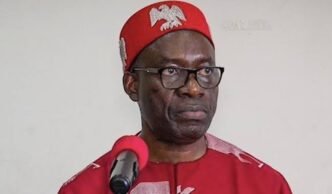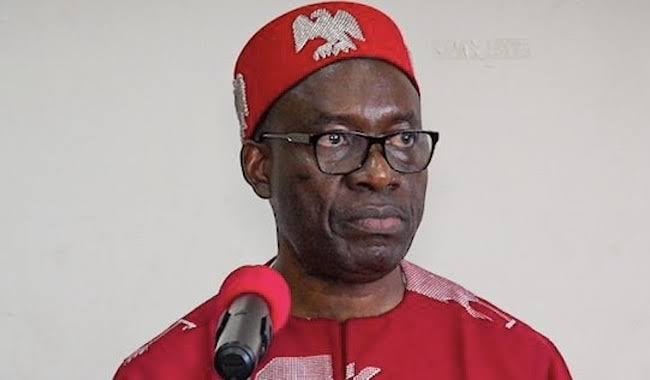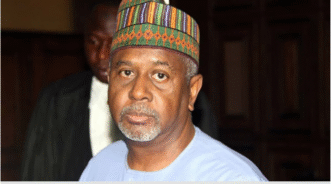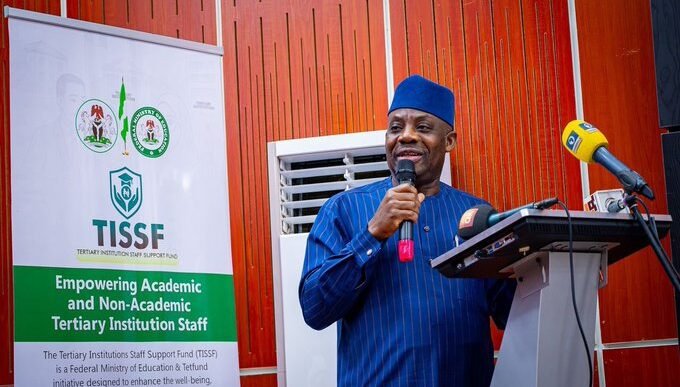October 14, 2025
In a significant development for Nigeria’s electoral governance, President Bola Ahmed Tinubu has formally written to the Senate, requesting the screening and confirmation of Professor Joash Amupitan (SAN) as the new Chairman of the Independent National Electoral Commission (INEC). The communication, read during plenary by Senate President Godswill Akpabio, sets in motion the constitutionally required legislative oversight process for the appointment.
Key Highlights
- The Senate President read the letter from President Tinubu during its plenary session on Tuesday.
- Tinubu’s request is grounded in Section 154(1) of the 1999 Constitution (as amended), which mandates Senate confirmation for the appointment of the INEC Chairman.
- Senate President Akpabio referred the nomination to the Committee of the Whole for deliberation “as soon as practicable.”
- The nomination follows the expiration of the tenure of outgoing INEC Chairman Professor Mahmood Yakubu.
- President Tinubu also sought confirmation for other appointments, including Mrs. Ayo Omidiran as Executive Chairman of the Federal Character Commission and 28 additional federal commissioner slots.
Who Is Professor Joash Amupitan?
Professor Joash Ojo Amupitan is a distinguished legal scholar, Senior Advocate of Nigeria (SAN), and academic with a notable track record in the legal and educational sectors.
Background & Credentials:
- Born in Aiyetoro-Gbede, Ijumu Local Government Area, Kogi State, Amupitan obtained his LL.B in 1987, LL.M in 1993, and Ph.D. in 2007 from the University of Jos.
- He joined the University of Jos as a lecturer in 1989 and rose through the ranks to become a professor of law.
- Over the years, he has served as Dean of the Faculty of Law, Head of the Department of Public Law, and Chairman of the Committee of Deans and Directors at the University of Jos.
- His areas of specialization include company law, evidence law, corporate governance, and privatization law.
- In 2014, he was elevated to the rank of Senior Advocate of Nigeria (SAN).
- He has also served as Pro-Chancellor and Chairman of the Governing Council at Joseph Ayo Babalola University and held key positions in legal and educational institutions.
If confirmed, Amupitan would become Nigeria’s 13th substantive INEC Chairman, succeeding Professor Mahmood Yakubu, whose tenure ended this month.
The Appointment: Timeline & Legal Basis
1. Expiration of Yakubu’s Tenure
Professor Mahmood Yakubu’s 10-year term as INEC Chairman concluded in October 2025. Following his exit, May Agbamuche-Mbu, the senior national commissioner, has been acting in the role.
2. Presidential Nomination and Council of State Approval
President Tinubu presented Amupitan’s name to the National Council of State, which reportedly approved the nomination after deliberation. The presidency described Amupitan as an “apolitical and experienced administrator” whose background in law and governance would strengthen INEC’s institutional independence.
3. Transmission to the Senate
In line with constitutional procedure, President Tinubu formally transmitted a letter to the Senate requesting confirmation. The letter included Amupitan’s curriculum vitae and emphasized the importance of filling the role promptly to ensure continuity in INEC’s leadership.
4. Senate Action
After reading the President’s letter, Senate President Godswill Akpabio referred the request to the Committee of the Whole for further screening and recommendation. The Senate is expected to deliberate on the nomination in the coming days.
What This Means for Nigeria’s Electoral Future
The confirmation of a new INEC Chairman marks a crucial moment for Nigeria’s democracy. The incoming leadership will guide the commission through reforms, electoral preparations, and challenges ahead of future elections.
Credibility and Independence:
Stakeholders across the country have called for transparency and merit-based evaluation during the Senate screening. Civil society organizations emphasize that an independent INEC is essential for credible elections.
Public Confidence:
Public trust in INEC has fluctuated in recent years, with debates around transparency and logistics in the last general elections. Amupitan’s confirmation process will therefore be seen as a test of the administration’s commitment to credible elections.
Institutional Challenges:
The new chairman will have to confront numerous operational issues, including voter register accuracy, election logistics, funding, staff training, and the implementation of technological reforms like electronic result transmission.
Legacy of Mahmood Yakubu:
Professor Yakubu’s decade-long tenure witnessed the introduction of several innovations, including the Bimodal Voter Accreditation System (BVAS). However, his time in office was also marked by controversies surrounding electoral credibility. Amupitan’s administration will be expected to consolidate on these gains while addressing identified lapses.
Stakes and Observations
- First from North-Central: Professor Amupitan is reportedly the first nominee from the North-Central geopolitical zone to be considered for the INEC Chairmanship.
- Senate Dynamics: Lawmakers from across party lines are expected to weigh the nomination carefully, given the political implications of the role.
- Other Appointments: The President’s communication also included nominations for key federal bodies, signaling an ongoing reorganization of major commissions that require Senate oversight.
What Happens Next
- Committee Screening: The Senate Committee of the Whole will scrutinize Amupitan’s qualifications, experience, and public record.
- Public Hearings: If the Senate opts for open hearings, civil society groups and the public may be invited to present views or objections.
- Committee Report and Vote: The committee will then submit its report to the Senate for a final decision.
- Swearing-In: If confirmed, Amupitan will be officially sworn in as INEC Chairman by President Tinubu.
- Transition and Continuity: He will immediately assume duties to ensure the seamless continuation of INEC’s administrative and operational activities.
Challenges Ahead
1. Ensuring Electoral Integrity:
Amupitan will be expected to strengthen mechanisms that safeguard election results, enforce campaign finance laws, and address voter suppression concerns.
2. Rebuilding Public Trust:
INEC’s credibility has been under scrutiny; regaining citizen confidence will require consistent transparency, timely communication, and improved election logistics.
3. Collaboration with Stakeholders:
The new chairman will need to maintain open dialogue with political parties, civil society, and the media to ensure inclusive decision-making.
4. Electoral Reform Implementation:
The incoming INEC leadership will oversee the continued rollout of electoral reforms enacted after the 2023 elections, particularly in technology integration and voter education.
5. Political Pressure:
Given Nigeria’s charged political environment, maintaining independence from executive and legislative influence will be critical for Amupitan’s success.
Conclusion
President Bola Tinubu’s decision to nominate Professor Joash Amupitan (SAN) as the next INEC Chairman represents a defining moment for Nigeria’s democratic trajectory. The Senate’s response will not only determine the leadership of the nation’s foremost electoral body but also signal the government’s broader stance on institutional integrity and democratic reform.
As the confirmation process unfolds, Nigerians will be watching closely — expecting the Senate to uphold transparency, fairness, and constitutional due process. Should Amupitan be confirmed, he will shoulder the enormous responsibility of leading INEC into a new phase of electoral management, one that demands credibility, innovation, and unwavering impartiality.
The coming weeks will be critical, as the National Assembly deliberates and the nation anticipates a decision that could shape the future of Nigeria’s democratic system for years to come.
— End of Report —

